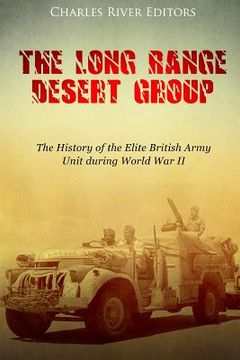The Long Range Desert Group: The History of the Elite British Army Unit during World War II (en Inglés)
Reseña del libro "The Long Range Desert Group: The History of the Elite British Army Unit during World War II (en Inglés)"
*Includes pictures *Includes accounts *Includes online resources and a bibliography for further reading "The desert was quivering with heat. The gun detachments and the platoons squatted in their pits and trenches, the sweat running in rivers down their dust-caked faces. There was a terrible stench. The flies swarmed in black clouds upon the dead bodies and excreta and tormented the wounded. The place was strewn with burning tanks and carriers, wrecked guns and vehicles, and over all drifted the smoke and the dust from bursting high explosives and from the blasts of guns." - Cecil Ernest Lucas-Phillips The fighting in North Africa during World War II is commonly overlooked, aside from the famous battle at El Alamein that pitted the British under General Bernard Montgomery against the legendary "Desert Fox," Erwin Rommel. But while the Second Battle of El Alamein would be the pivotal action in North Africa, the conflict in North Africa began all the way back in the summer of 1940, when Italian dictator Benito Mussolini declared Italy's entrance into the war. From his perspective, the fact that the British and French had their hands full with the Germans created an opportunity for Italy to enlarge its colonial holdings in Africa by seizing portions of the British Empire. However, British troops in the colony of Egypt responded to Italy's declaration of war by driving through the Egyptian-Ethiopian border and attacking Italian troops stationed in the Italian colony of Ethiopia. By September 13, 1940, Italian commanders in Ethiopia were finally ready to put Mussolini's plan into action and attack British colonial holdings, but British troops had already attacked a series of Italian frontier posts and had inflicted 3,500 casualties among Italy's North African troops. Although British maneuvering in North Africa began successfully against the Italians, the British forces suffered a series of defeats over the next two years, due to several problems the British army faced as a result of inadequate preparation and weaponry. For example, when the war began, junior officers were unprepared for the kind of cooperation between units that was necessary in the battles of North Africa. At the same time, while British tanks were capable of opposing Italian tanks, they were vastly inferior to German models. Dealing with the Italians was one thing, but the British faced an entirely different monster in North Africa when Erwin Rommel, a German general who had gained much fame for his role in the invasions of Poland and France, was sent to North Africa in February 1941. For the next two years, the Allies would face off against the legendary Desert Fox and his Afrika Korps. As a specific unit, the Afrika Korps represented only a small part of the German forces deployed in the North African theater, but the term "Afrika Korps" has since come to imply all forces under Rommel's command, and the Afrika Korps is now associated with all German war efforts in North Africa. On August 1, 1945, a month before the formal end of World War II, the British War Office announced the disbanding of a small, eclectic unit, the Long Range Desert Group. Since its founding five years earlier, in June 1940, the LRDG had pioneered and refined the concept and tactics of deep penetration, covert reconnaissance in both the North African desert, and later as a more varied special forces operations unit in the Aegean, Italy and the Balkans. The LRDG, although built on work done during the North African desert campaigns of World War I, suffered a difficult gestation at the onset of World War II, and it was only much later revived after World War II in the era of Vietnam and the African counterinsurgency wars to become a standard configuration in most modern armies. The Long Range Desert Group: The History of the Elite British Army Unit during World War II chronicles one of World War II's most famous fighting units.

